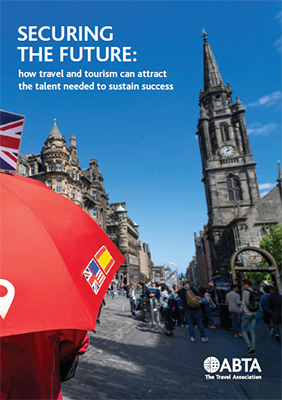
Please note: Our website no longer fully supports IE11, as such you may encounter issues using our website, please try an alternative browser such as Google Chrome, Mozilla Firefox, Microsoft Edge (Windows) or Safari (Mac).

Please note: Our website no longer fully supports IE11, as such you may encounter issues using our website, please try an alternative browser such as Google Chrome, Mozilla Firefox, Microsoft Edge (Windows) or Safari (Mac).

The UK Government is embarking on two entirely separate, but closely linked, reform processes that will have significant and long-lasting implications for the future of UK travel and tourism; (1) reforming the UK’s immigration system, and (2) negotiations on a future UK-EU trading relationship. This report outlines the shape of the UK’s travel and tourism industry, and spells out what is needed to ensure the industry remains prosperous in the decade ahead.
The travel and tourism mix is an integral part of the UK economy, across every region and nation. The industry makes an economic contribution in excess of £145bn every year1, sustains more than 1.52m jobs directly, and supports about the same number again within industry supply chains. The proportion of non-UK nationals working in travel and tourism stands at 13%, which is nearly a third higher than the average amongst all UK businesses. 9% of all workers come from within the EU2.
Too often in the immigration debate we hear criticism that businesses are overly focused on attracting migrant workers, and not sufficiently so on investment in skills and training at home. For the travel and tourism industry this is untrue. Travel and tourism businesses are investing significantly in skills development, both in terms of nurturing domestic talent, and upskilling the existing workforce. The industry’s commitment is demonstrated through proactive involvement in the Tourism Sector Deal, a crucial component of which is a Skills Delivery Board, designed to facilitate the delivery of thousands of new apprenticeships and to ensure the travel and tourism industry is positioned as an attractive career choice. However, to see immigration and skills investment as an either-or choice is mistaken. Tourism businesses need both to work in tandem to continue to prosper.
We also need a future trading relationship with the EU that maintains the valuable travel flows, and cultural exchange, that has developed over recent decades. It is welcome that both sides have already stated in public their desire to ensure visa-free travel continues for short-term leisure or business purposes. It is important this constructive start to talks is built upon to reach creative solutions that preserve employment arrangements that have played an important role in underpinning the industry, and which provide clear mutual benefits. For example, the Posted Workers Directive, has enabled travel companies to enjoy operational flexibility that has become an integral part of their business models. It is estimated that around 15,000 UK workers benefit from the Posted Workers Directive every year3, working for temporary periods across the EU whilst retaining their UK employment and social security status. Similarly, inbound operators benefit from the ability to have EU nationals here to support visitors to the UK, especially given the shortage of foreign language skills in the UK workforce.
Tourism is one of the UK’s major success stories, and a source of soft power as the UK seeks to extend our global links and influence. But, tourism doesn’t happen by accident. The industry is particularly reliant on strong links to Europe – our primary destination and source market for both tourists and business travellers.
The UK Government must send clear signals that the UK remains an open tolerant place to do business with and to visit. Ministers must also make a conscious decision to value the UK’s travel and tourism industry – by actively prioritising the policy choices that underpin our success, otherwise the significant economic and cultural benefits our industry brings will be put at risk.
Mark Tanzer, Chief Executive
